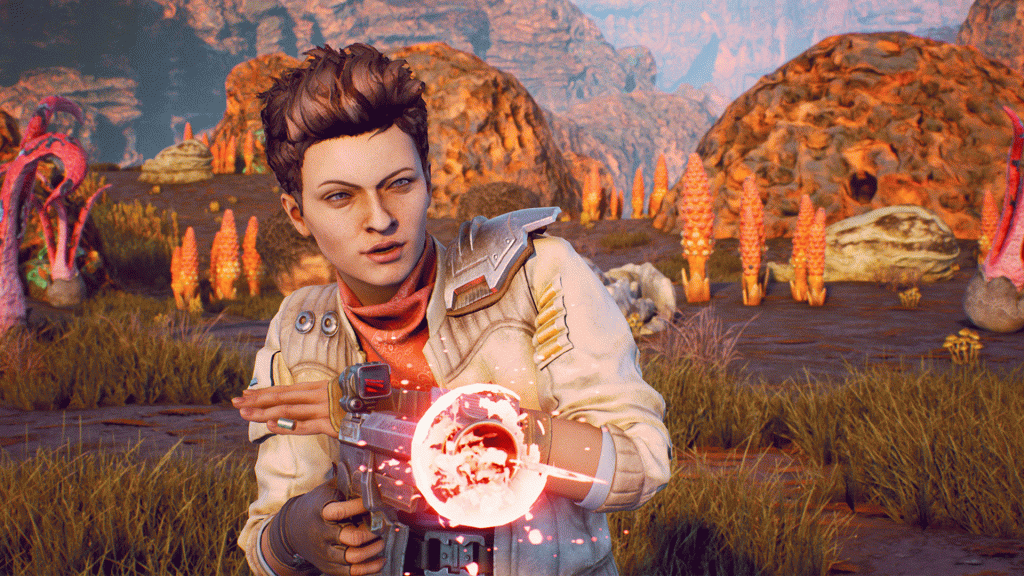Patrik Tripes shares his opinion on how The Outer Worlds has proven that story-driven single-player games are what gamers really want from the industry.
The release of Obsidian’s The Outer Worlds has highlighted a certain fact about today’s gaming industry; one I think many people in said industry, perhaps especially ‘triple-A’ game developers, have failed to see in recent years.
That making a good game results in getting a good profit.
Somehow, this simple statement of cause and effect has been forgotten by most major studios, chief among them Ubisoft, EA, and practically every other big-name developer in the industry. In the eyes of large studios today, the key to financial success is not a quality experience; it is, to put it bluntly, addiction and gambling. You may have noticed the change that came around 2013-2014. Single-player games getting rarer and rarer, replaced with online-only multiplayer that simply strands a bunch of players on an island and has them scramble to kill each other in a resource-scarce environment – PUBG, Fortnite, along with every other knock-off and clone that was spawned from DayZ’s success in the early 2010s.

Players are nickel-and-dimed all the way, constantly tempted with skins, loot boxes, and premium currency of every stripe and caliber; the first thing you see upon starting a game is an ad for buying Funbucks™ on the main menu. Players are forced into repetitive grind and then tempted to speed their way along through micro-transactions, as was the case for the last two Assassin’s Creed games, which eschewed the traditional skill-based combat system in favour of levelling. The cause for this is clear; the more you can quantify, the more you can sell for real-life cash.
It is balancing the player’s frustration with levelling up against their willingness to spend money, like some kind of free mobile game. However, while this frustration is acceptable for a free game which requires no investment to play, this is going beyond the pale. £60 games now carry these free-to-play trappings as a matter of course, as if the initial investment wasn’t enough. The few games that remain untainted by this are either carved up on the operating table, their pieces sold as overpriced ‘expansions’, or they are squeezed into the multiplayer mold for no other reason but trend-chasing – looking at you, Fallout 76.
To sum it up, I think publishers and developers feel that they must trick people into playing their games. To tempt and cajole like a devil at the crossroads instead of simply making a quality product and letting it speak for itself.
This all might seem perfectly normal for younger gamers, but to those of us above the age of twelve, this is grim. Perhaps even depressing.
However, things aren’t as bad as they seem. All these so-called ‘surprise mechanic’ games that try to trick you into hammering the ‘buy’ button like a rat with a food dispenser, well, their success is waning. Bethesda is being torn to shreds by both customers and the press, and Australia’s gaming commission recently forced them to give out refunds to all who request them – setting a precedent for the rest of the world. A representative of Electronic Arts has also publicly called loot boxes ‘surprise mechanics’ in front of Parliament, and legislation is already on the books to regulate this unethical practice.
Smaller developers are already stepping up to serve the markets that the larger companies abandoned in the rush to be trendy, as was the case for Obsidian Entertainment’s The Outer Worlds. Released just last month, the game is selling like hotcakes and already being critically hailed as a masterpiece, with nary a ‘surprise mechanic’, skin, or Funbuck™ in sight.

Similarly, Konami’s alienation and eventual firing of Hideo Kojima in their push to focus on pachinko, gambling, and mobile games ended with them shooting themselves in the foot, and the now independent Kojima Productions’ long-anticipated Death Stranding was released to critical acclaim earlier this month, again with no microtransactions.
Surprisingly, EA recently went against two of the worst excesses of the current industry – forced multiplayer and microtransactions – by publishing Respawn’s single-player Star Wars Jedi: Fallen Order, once again with no microtransactions or lootboxes, garnering a generally positive response.
It honestly says a lot about the industry that developers making and actually selling games as complete products feels like something that deserves to be lauded, but here we are. While time will tell whether or not this behavior continues on EA’s part, one thing is becoming clear; the winds are changing. With Fallout 76 floundering, triple-A sales dropping, and most games using the ‘games as service’ model becoming ghost towns within months after release, things are slowly but surely turning around. While big publishers and developers are extremely unlikely to change their ways out of morals or ‘the love of the art’, they do smell money, and the money’s somewhere else – in a quality product, well-made.
Customers have voted with their wallets, and it’s paid off.
Feature image credit: Bethesda Game Studios.